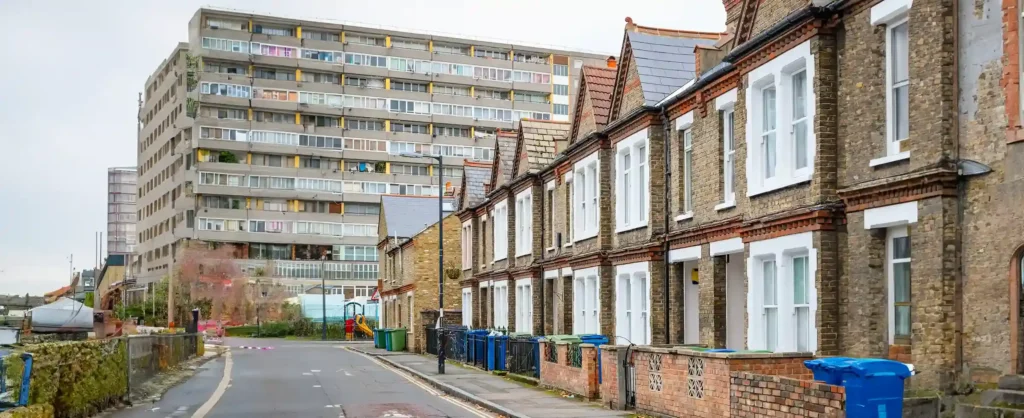If you’re unfortunate enough to be navigating the current mortgage and housing crises, you may have heard of the Renters Reform Bill introduced in May this year.
Labelled a “once-in-a-generation overhaul of housing laws,” the bill is currently being prepared for a second reading before parliament where MPs will be given a second opportunity to debate its terms.
Regardless of the final policies outlined by the bill, the Renters Reform Bill has been designed to create a more equitable housing market for tenants. But what exactly does that mean for them and for present and future landlords who want to be certain their properties are operating within the confines of the bill’s new laws?
If you’re eager to know more about the Renters Reform Bill, why it was introduced and what impact it might have on the housing market, the team at Concept Capital Group have put together a deep dive to help housing sector hopefuls come to terms with the future of the private rented sector.
What is the Renters Reform Bill?
In broad terms, the Renters Reform Bill is a proposed piece of legislation that aims to balance the scales of the housing market by reinforcing the rights of renters and abolishing Section 21 “no-fault” evictions – otherwise known as evictions where no justification or explicit reason is given by the landlord to the tenant.
Since its introduction to parliament in May this year, the bill has drawn media attention for its potential to completely shift the current state of renting. Some of the most eye-catching terms outlined in the proposed reform include:
- Increased protection against excessive rent hiking, with tenants able to appeal excessively above-market prices designed to force them out
- The introduction of a new private rental ombudsman to provide fair and binding resolution to disputes brought by landlords and tenants
- An online private rental property portal to guide landlords through their legal obligations and help tenants make informed decisions
- Increased scope for tenants to request pets at their rented properties, with landlords unable to unreasonably refuse these requests
- An outlawing of blanket bans on renting to tenants on benefits or with children
Announced as a part of the government’s more comprehensive plans for the private rented sector in the 2022 whitepaper ‘A Fairer Private Rented Sector’, which proposed a range of methods and strategies for balancing the sector to better support the needs of tenants. These include a new legally enforceable Decent Homes Standard for private rented housing that aims to half the number of non-decent rented homes in the sector by 2030.
Has the Renter’s Reform Bill Already Changed the Housing Market?
The abolition of Section 21 – the process that has previously helped landlords to easily evict tenants to repossess their property – has had an especially significant impact on the way many landlords and tenants view themselves and one another concerning the housing market.
A 2021 State of the Lettings Industry report from lettings platform Goodlord showed that 55% of agents were concerned that the abolition of section 21 could harm the private rented sector, forcing landlords to more aggressively hike prices to compensate for a lack of security or leave the market to avoid the hassle of being unable to reclaim their property from unruly tenants.
According to figures gathered by the Ministry of Justice, rental evictions within England and Wales rose by a staggering 98% between 2022 and early 2023, leaving many renters feeling insecure and frightened during a period of rising mortgage rates. This phenomenon has only been worsened by the number of landlords who have been raising rent costs or exiting the market altogether to avoid mortgage woes and regulatory changes like the Renters Reform Bill and rising minimum EPC standards.
Though some news outlets have described the ‘landlord exodus’ as an exaggeration, a rental market report from leading property company Zoopla suggests that 51% of landlord sales are taking place in London and the South East, where rental yields are low and extra equity is required when refinancing mortgages. The report also suggests that:
- Over 1 in 10 homes sold through Zoopla were former lettings by private landlords exiting the market in the last three years
- Higher mortgage rates have most impacted landlords with high loan-to-value mortgages of 50-75%, accounting for 20-30% of landlords
- The proportion of landlords returning to the rental market following 2020 departures has fallen to 30%
For renters, the aftershocks of these changes to the housing market are already being felt. The same Zoopla report also revealed that there are 33% fewer homes available to rent in 2023 than the average over the last five years despite demand for housing currently exceeding the average by around 50-85%. Other renter pain points were also highlighted, including:
- Annual rental inflation of 10.4% year-on-year for new let properties
- Rental costs taking up the highest proportion of earnings in a decade at 28%
- Rental costs outgrowing average earnings over the last 21 months
- The number of renters falling into rent arrears doublings in the last six months
At least in the short-term, the implications of the Renters Reform Bill have caused a kind of chain reaction within the private rented sector that could create a lasting impact for landlords and tenants alike.
How Will the Renter’s Reform Bill Change the Housing Market?
The Renter’s Reform Bill may have led to an immediate panic for some, but many of its actual terms have the potential to benefit both landlords and tenants once they are put into practice.
One of the proposed changes from the bill involves moving all assured shorthold tenancies into a single, simplified system of periodic tenancies that simplify the existing structure of short-term tenancies.
Assured shorthold tenancies are extremely commonplace in the private rented sector, with contracts of 6 or 12 months followed by renewal and exit options generally being preferred by letting agencies and landlords.
The Renter’s Reform Bill would introduce a rolling periodic tenancy that exists without a specified tenancy end date, allowing tenants to leave more readily with at least two months’ notice. This would not only give tenants a greater level of freedom but also allow landlords to recoup the costs associated with securing a tenancy and minimise the risk of void periods due to less hesitation and contractual obligation among renters.
The increased scope for tenants to request that rented homes accommodate pets, meanwhile, could be welcome news for both landlords and renters, as a recent survey by the Deposit Protection Service suggests that as many as 30% of tenants who moved between 2021 and 2022 did so to accommodate a pet. A greater number of rented homes that allow for pet ownership could bring in an influx of renters who previously may not have considered a property.
Meanwhile, the bill’s suggested amendments to the Tenant Fees Act 2019 regarding the quality of pet insurance will provide landlords with a greater level of reassurance and put more responsibility on tenants for any damage caused by pet ownership.
Perhaps one of the greatest areas for concern among landlords reviewing the Renters Reform Bill is the proposed doubling of the notice period for rent increases and their being restricted to once a year. This change may be intended to stop landlords from creating disproportionate price inflation within the private rented sector through frequent, unnecessary rent hikes, but some may see it as a potential obstacle to necessary increases that account for inflation, changes to energy or water suppliers and other factors outside of their control.
How Concept Capital Group Helps Uncertain Landlords
For landlords worried about the increased regulation of the Renters Reform Bill and how it may consume both their time and resources as it reshapes the private rented sector, we are here to offer a modern alternative to traditional private letting that promotes a fair system for tenants without giving landlords too much to worry about.
At Concept Capital Group, we have cultivated a unique property investment opportunity that offers all the benefits of owning private rented housing without demanding that our customers adjust to shifting legislation.
With a single upfront payment starting from £42,999, you could own a fully-managed modular home that we build, place and fill with a pre-approved tenant from a list of over 800 candidates. The efficiency we have built into our service means you will receive your first rental payment within 90 days of purchase and enjoy a consistent 10% annual yield on your investment with no void periods, no maintenance costs and no hidden fees.
Want to start your investment journey? You can book a call with our team today.













